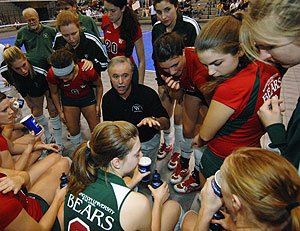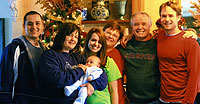It’s a chilly April afternoon, and in the Field House, the rhythmic sound of volleyballs hitting a hardwood floor resonates. The last spring practice for the volleyball team — the national championship volleyball team — is about to begin.

Not a coach is in sight as the players continue their drills, serve after serve, volley after volley. This is not a team that rests on its laurels; the young women know it is in moments of repetition like these where champions are made.
“We always come early to warm up,” rising senior Audra Janak says. “We don’t want to waste his time.”
“His” refers to affable, unassuming coach Rich Luenemann, a man with 904 career victories, two national titles and enough coaching honors — including National Coach of the Year in 2003 and 2007 — to fill a wall.
And yet, Luenemann would be the first to tell you he’s the most undeserving coach out there and owes it all to the players he has had the privilege to coach in 27 college seasons. That and the two men who led him into volleyball.
Accidental volleyball coach
Luenemann, who grew up in Litchfield, Ill., was a 24-year-old college graduate in 1974 looking for employment after earning a master’s degree in education from Eastern Illinois University when he got a job teaching mental health at a middle school near Chicago.
“That was a tough time to be looking for a job as a teacher,” Luenemann says. “Mental health? It was the feel-good 1970s. Then an opening came up in the district for a head volleyball coach, and the superintendent asked me if I wanted the job.
“I had no desire to be a volleyball coach,” he says. “I had coached basketball and baseball and played football in high school, but volleyball?”
Luenemann says he reluctantly agreed, but only if the superintendent couldn’t find anyone else. “Next thing I know, he’s telling me when practice is starting,” Luenemann says. “I said to him, ‘You really didn’t look for anyone else, did you?’ He said no. I didn’t know a thing about volleyball. That first year, we were OK. The second year, we came in third in state.”
A few years later, Luenemann saw an ad for a junior varsity volleyball coach at the College of St. Francis (now University of St. Francis) in Joliet, Ill., a National Association of Intercollegiate Athletics (NAIA) school where Chicago coaching legend Gordie Gillespie coached baseball and later football.
“His name was on the ad as athletic director,” Luenemann says. “I applied for the job simply because I wanted to meet Gordie.”
Luenemann accepted the offer mainly to work under Gillespie, the winningest baseball coach in college history at any level and the designated NAIA Coach of the Century who still coaches baseball at St. Francis at age 82.
“I got to watch Gordie in action,” he says. “I’d watch his demeanor, his interaction with the players, his game management — he was the best I ever saw.”

By 1981, Luenemann was head coach at St. Francis, where he amassed a 590-262 record (.692) in 18 seasons — including seven trips to the NAIA tournament. He was inducted into the NAIA Hall of Fame in 1996.
A perfect fit
Luenemann wasn’t exactly unknown when he got word Washington University was looking to replace a legend of its own, Teri Clemens.
“I pursued it with all the zest I possibly could, including offering to wash John Schael’s car,” he says.
Schael, WUSTL’s athletic director since 1978, says Luenemann was a perfect fit.
“His reputation for integrity, character and knowledge of the game when coupled with his experience, enthusiasm and ‘fit’ within the WUSTL community made our choice an easy one,” Schael says.
Luenemann began working at WUSTL March 1, 1999, sleeping in historic Francis Gymnasium five nights a week for a few months until he found a house for his family in Edwardsville, Ill.
From the beginning, Luenemann immersed himself in recruiting students first, athletes second.
“I want the kids in class,” he says. “The academic community realizes athletics are important but not the primary focus here. I want recruits who come on campus to talk to professors as part of their visit. I want the University to sell itself first, then we’ll talk volleyball.”
Luenemann talks about his players’ academic prowess like a proud father.
“My favorite times with my team are on the bus when we’re coming home from a road game, and I’m just sitting back listening to the cerebral conversations of the players,” he says. “Our players are so intelligent — they’re talking about marketing concepts and medical procedures — and I want to jump in and say ‘Hey, what about the Cardinals?’ ”
In nine seasons with the Bears, he has a 314-41 record and surpassed 900 career wins last season for a career total of 904-303 (.749). He reached the NCAA regional tournament his first season and the NCAA tournament in each season since, reaching the title game five times and winning it twice.
“He brings energy, passion and organization to each and every practice and competition,” Schael says. “Always prepared, Rich has high expectations for himself and the student-athletes representing Washington University volleyball. He treats each player with dignity and respect regardless of the competitive outcome.”
‘Luckiest guy in the world’
|
Rich Luenemann |
Years at WUSTL: Nine (314-41 record) Education: Bachelor’s degree, psychology, 1972, master’s degree, education, 1974, Eastern Illinois University Coaching Honors: Division III American Volleyball Coaches Association National Coach of the Year, 2003, 2007; Chicagoland Collegiate Athletic Conference Hall of Fame Inductee, 1991; National Association of Intercollegiate Athletics Hall of Fame Inductee, 1996; University of St. Francis Hall of Fame, 2008 Hobbies: “Free time? What’s that? I spend six days a week in the offseason recruiting,” Luenemann says. “But in four years, if I have time, I think I’d like to do some recreational reading, woodworking or biking.” |
But Luenemann is not one to be complacent — or allow his players to be, either. Back at spring practice, with the team sufficiently warmed up, Luenemann walks in the gym and tapes a newspaper clipping to the bleachers. It’s a column by St. Louis Post-Dispatch sportswriter Bernie Miklasz about the gritty play of St. Louis Cardinals player Albert Pujols.
The team huddles around reading passages highlighted by Luenemann that compare Pujols to the 1934 Cardinals — the Gas House Gang — who were known for their gritty, hard-nosed play. Another passage contained a quote from baseball manager Leo Durocher: “Give me some scratching, diving, hungry ballplayers who come to kill you.”
It’s an approach Luenemann has, and one his players adopt on the court. When asked if his team’s goal is to repeat as national champions, Luenemann doesn’t deflect.
“Some coaches will say winning is the most important thing,” he says. “Winning is not the most important thing, but the will to win is. We begin a season and say, ‘Let’s win the national championship.’ It’s not a constant conversation, but it’s stated and it’s something we have in the back of our minds. Then we’ll work hard to reach that goal.”
There’s that work ethic again, willing his teams to the top.
“Without a doubt, our chemistry is the key to our success,” he says. “A common thread in our program is that our students are successful to begin with or they wouldn’t be here — they’re student council presidents and academic achievers — and they bring that same work ethic to the court.”
But it won’t last forever. Luenemann already has made it known he will coach for four more seasons and then “I’ll pass it along,” he says.
He’s doing it for his family. “We as coaches are somewhat selfish in that our families revolve around us,” he says. “I’ve really enjoyed coaching — in many ways it is the greatest enjoyment I’ve ever had — but in four years, it will be time for my wife, Joan, to dictate our lives.
“Joan is my coach,” he says. “She is the coach of the bank accounts and the bill-paying and the kids and all the other things that make a family.”
He says he’ll be upfront about that with next year’s recruiting class but doesn’t expect any drop-off in recruiting. “The University is what gets players here, not me,” he says.
And when the first volleyballs begin bouncing on the gym floor this August at the start of the fall season, the happiest guy on campus will be Luenemann.
“I get so excited about it,” he says. “The first thing I’m going to do is bridle my enthusiasm. Each year brings new challenges.
“Am I the luckiest guy in the world, or what?”